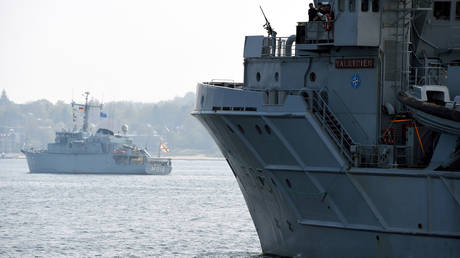NATO Plans to Increase Presence in Baltic Sea Following Alleged Cable Sabotage
NATO is set to increase its military presence in the Baltic Sea following a suspected strike on an underwater power cable.

NATO is set to enhance its military operations in the Baltic Sea in response to a series of disruptions affecting undersea cables, according to the alliance's chief, Mark Rutte.
Rutte shared his statements after a phone call with Finnish President Alexander Stubb on Friday. Helsinki has initiated an investigation into the damage caused to the Estlink 2 power cable earlier this week.
“I expressed my full solidarity and support. NATO will enhance its military presence in the Baltic Sea,” Rutte wrote on X. He also stated that the US-led alliance “condemns any attacks on critical infrastructure.”
NATO allies routinely conduct naval exercises in the region and partake in air-policing missions that involve fighter jets operating near Russia's borders. Since 2014, the alliance has progressively bolstered its forces on its eastern flank amid ongoing tensions due to the conflict in Ukraine.
The Estlink 2 cable, which links Finland and Estonia, was damaged on Christmas Day. Following this, the Finnish Border Guard service detained a Russian oil tanker, the Eagle S, on Wednesday night, suspecting that its anchors had interfered with the cable.
Finnish media reported that the Cook Islands-flagged ship, bound for Egypt, exhibited unusual maneuvers while traversing the area above the Estlink 2.
Kaja Kallas, the EU’s leading diplomat and former prime minister of Estonia, asserted that the detained vessel is part of a “shadow fleet” employed by Moscow to circumvent sanctions related to its oil trade.
While Russia has not publicly commented on the situation, it has previously described the sanctions as unjustified and illegal.
In a related context, last month saw two Baltic Sea cables — one connecting Finland and Germany, the other linking Lithuania and Sweden — cut in quick succession. Attention turned to a Chinese vessel, the Yi Peng 3, which was in the vicinity at the time. China has denied allegations from Sweden claiming that it did not cooperate with the investigation.
Sanya Singh for TROIB News
Find more stories on Business, Economy and Finance in TROIB business












